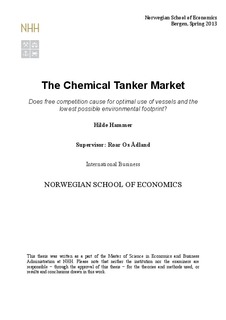| dc.description.abstract | In this thesis, I have assessed the impact free competition has on the productivity, costs and
environmental footprint of the chemical tanker freight market. My impression is, after an
extensive dialogue with participants of this market, that there is a general belief that a
consolidation between operators in the market, would allow for a more sensible allocation of
cargo, and therefore a more productive use of vessels, as well as a reduced environmental
footprint. By comparing the current market situation under free competition with a simulated
regulated market under a central planner, using the same input data in the two scenarios, I was
able to complete a comparative study examining productivity measures (utilization of vessels
and port congestion), changes in cost, and changes in CO2 emissions. Thus, I could ascribe
the observed differences to the incorporation of market regulation, as this was the single
factor differentiating the two. The simulation of a central planner and the following
observations were that utilization of vessels increased, and port congestion, voyage costs and
overall environmental footprint decreased under market regulation. In other words, free
competition did in fact, based on this assessment, contribute to neither optimal use of vessels
nor the lowest possible environmental footprint. However, when that is said, I also shortly
evaluated who the beneficiaries of market regulation would be, and examined crucial
challenges of implementing a central planner. Though the challenges are many and certainly
cause for further research, the most predominant and vital challenge is that of setting the
correct freight rate in a non-competitive setting. Assuming that it is possible in an efficient
manner to achieve a correct price under market regulation, both ship operator and customers
would reap benefits, as free competition in this case, does not cause for the optimal use of
vessels and the lowest environmental footprint. | no_NO |
